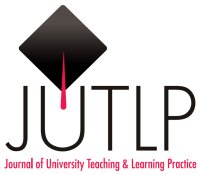The role of technological knowledge in the pedagogical integration of film in disciplinary teaching at universities.
Many university lecturers have integrated feature films and television series (FF/TV) into their lessons to improve student engagement. Although film in teaching might seem like a well-established practice, it is reliant on a range of fast-changing technologies to effectively integrate FF/TV into in...
| Institutions: | University of Adelaide Australian National University |
|---|---|
| Main Authors: | , , , , |
| Publicado em: |
Journal of University Teaching & Learning Practice v.19 n.3 https://doi.org/10.53761/1.19.3.10
2022
|
| Assuntos: | |
| Acesso em linha: | https://doi.org/10.53761/1.19.3.10 |
| Resumo: | Many university lecturers have integrated feature films and television series (FF/TV) into their lessons to improve student engagement. Although film in teaching might seem like a well-established practice, it is reliant on a range of fast-changing technologies to effectively integrate FF/TV into instruction, learning activities and assessments. This study utilises the Technological Pedagogical and Content Knowledge (TPACK) model to analyse survey and interview data regarding (1) lecturers' familiarity with a range of concepts and skills related to film production, delivery and integration technologies; (2) their methods of learning about technologies that help optimise their FF/TV use; and (3) their institution's provision and support in implementing various technologies integral to teaching with FF/TV. A modified framework is proposed to add to the pedagogical benefits of effective teaching with FF/TV at universities. [Author abstract] |
|---|---|
| ISBN: |


